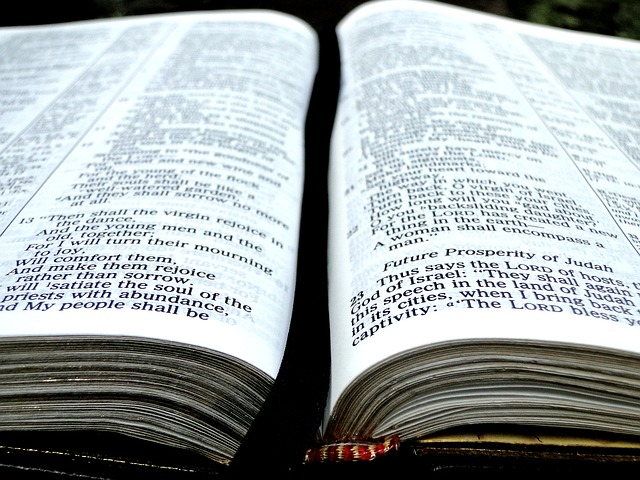Jeremiah Chapter 49 Lessons from the testSin Elevates the Ego In God's rebuke of Edom, He states that even if the people had built their houses in the clefts of the rock, He would bring them down to destruction. The Edomites trusted in their strength (their terribleness) to deliver them from invading armies. They allowed their physical prowess to elevate their egos. They began to think of themselves as lofty people, living above all others. They thought that like the eagle, they were the mightiest and swiftest of the predators. God, however, proved to them otherwise in their defeat to Babylon. When we get our eyes off of God and on us, we begin to elevate ourselves above what we actually are. We think that by our works we have accomplished something. For example, we may think that we are respected because of how superior we are. Such is the flesh taking credit for something it never had. Who made our bodies that they might be strong? God. Who gave us the mind to overcome challenges and excel in struggles? God. Who gives us a world in which to thrive? God. Everything we can ever accomplish is due to God's creation. Such is why we owe everything to Him. Sin, however, blinds us to this fact. Instead of honoring God when we use the gifts He has given us, we honor ourselves. We think of ourselves as the source of our success. God, then, has to knock some sense back into us. Such is one of the purposes of afflictions and difficulties in life; to deflate our elevated egos so that we once again acknowledge that God is source of our talents and blessings. Verse by Verse Commentary 1a God continues to pronounce judgment on nations through Jeremiah. This is in keeping with Jeremiah’s original commission when God told him that he would build up and destroy nations with his words (Jer. 1:10). 1b-6 God rebukes the Ammonites for taking Israel’s territories. If there were no Jews left, then they could inherit the land, but since the Jews are still here, the Ammonites are taking that which does not belong to them. In response, God will destroy nation. The Ammonite king will be taken in captivity and the daughters will be burned. This may seem harsh, but the Ammonites sinned so greatly that God had decreed to Moses that they are forever barred from participating in the sacred offices of the Lord (Deut. 23:3). Some of the sins of the Ammonites are listed here; namely, glorying in their sins, trusting in their treasures, and pride (thinking nothing can come against them). God will rebuke them by instilling them with fear. This shows that God sometimes judges by ensuring that what happens is the exact opposite of what sinners think will happen (thinking no one can come against them, God sends Babylon to destroy them). Compare this judgment with the judgment against Moab (Jer. 48:7-8). Also noteworthy is that God demonstrates grace by promising to restore Moab from captivity. God shows grace to whom He will. 7 Edom is another name for Esau, Isaac’s son (Gen. 25:30). Teman was the son of Eliphaz the son of Esau and was a duke (Gen. 36:15). Dedan was the son of Raamah, son of Cush, son of Ham, son of Noah (Genesis 10:7). Ezekiel describes the city of Dedan as merchants arrayed in gold and jewelry (27:20). See also Jeremiah 25:23. God rebukes the Edomites for their lack of wisdom. Since the fear of the Lord is the beginning of wisdom (Ps. 111:10), their idolatry and hatred of God’s people demonstrates a lack of wisdom. 8 The calamity of Esau is the loosing of his birthright and blessing. See Genesis 25:29-34, 27:1-41. 9-11 God is saying that He will not have mercy on this generation of Edomites. The children, however, will be spared. See Deuteronomy 24:16. 12-13 The Jews were not appointed to wrath, yet God has made them drink the cup of His wrath because of their sins. If He has thus treated His own people, how can the Edomites who have always been under God’s wrath expect to go unpunished? 14-16 Having a nest on the cleft signifies having the upper hand and most secure location. The Edomites believe that they are secure in their sin, yet God will destroy them. He will even make them worthless and minuscule in the eyes of the surrounding countries (the heathens). 17-19 God challenges the Edomites. As there is no one who can stand against Him, God is saying that assuredly His prophecy against Edom will come to pass. It will be utterly destroyed for its sin, just as Sodom and Gomorrah was destroyed. All the nations will recognize this destruction is from God and will therefore hiss at what was once the nation of Edom. 20-22 God concludes the prophecy against Edom by stating that an invading army will fulfill His judgment against the nation. God will strengthen the invaders to the point that the least of them will be able to overthrow the mightiest of the Edomites. On Teman, see v. 7, and on Bozrah see Jeremiah 48:24. 23-27 Damascus is first mentioned in Scriptures in Genesis 14:15. It is a city north of the promised land that lies just east of Lebanon. It was the capital of the Assyrians and is currently the capitol of Syria. God pronounces destruction against its allied cities and the palace of its king. Like with the other nations, God is judging the ruler and the political/social centers by destroying the key cities of worship, Hamath and Arpad (II Ki. 18:33-34). For the location of Hamath, see Numbers 13:21. 28-33 Once again, Nebuchadnezzar will be God’s instrument of judgment against a nation. He will take away anything of value and leave the land desolate. The people of Kedar (the second son of Ismael) live without fear, trusting in their wealth. All of their worldly goods will not deliver them from the hour of judgment. See Isaiah 21:16-17. 34-39 Elam was the son of Shem, the son of Noah (Gen. 5:32, 10:22). The land of Elam is in modern day Iran. Like the judgment against Kedar, instead of utterly destroying the people, God promises to scatter them abroad. Their lands will become desolate, but God's grace will save their lives. In the "latter days," He will restore them to their lands. (The "latter days" are merely the last days of the earth, which is the age in which we currently live; it is the age of the dispensation of grace, the time between Jesus' atoning death and the judgment that will come at His second appearing.) ___________________ Thank you for your faithfulness in studying God’s word. Please comment below to share what you learned from today's lesson.
0 Comments
Leave a Reply. |
Devotional Categories
All
Archives
September 2023
|
|
Join my mailing list!
|
Thank you!You have successfully joined our subscriber list. |
|
© 2024 Melissa Beaty
|
